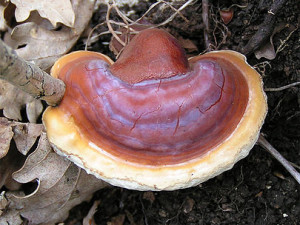The lingzhi mushroom or reishi mushroom (traditional Chinese: 靈芝; pinyin: língzhī; Japanese:reishi; Vietnamese: linh chi; literally: “soul/spirit mushroom”) is a species complex that encompasses several fungal species of the genus Ganoderma, most commonly the closely related species Ganoderma lucidum.
Contents
Uses
- Ganoderma Iucidum is used for boosting the immune system; viral infections such as the flu (influenza), swine flu, and avian flu; lung conditions including asthma and bronchitis;heart disease and contributing conditions such as high blood pressure and high cholesterol; kidney disease; cancer; and liver disease.
- It is also used for HIV/AIDS, altitude sickness, chronic fatigue syndrome (CFS), trouble sleeping (insomnia),stomach ulcers, poisoning, and herpes pain.
- Other uses include reducing stress and preventing fatigue.
- In combination with other herbs, Ganoderma Iucidum is used to treat prostate cancer.
Benefits
- Exhibits Anti-cancer Activity: A study published in the May 2004 issue of “International Journal of Oncology” explored the effects of Ganoderma lucidum on cell growth, cell cycle and cell death in human prostate cancer cells. The results of the study showed that Ganoderma lucidum prevented the multiplication of cancer cells in a dose- and time-dependent manner. The reishi mushroom did so by decreasing the expression of proteins — cyclin B and Cdc2 — that allow cancer cells to expand uncontrollably and by increasing the expression of a protein — p21 — that suppresses growth of cancer cells. In addition, Ganoderma encouraged death of prostate cancer cells. The study concluded that Ganoderma lucidum may play a role in preventing and treating cancer.
- May Help Fight Cancer-Related Fatigue: Ganoderma lucidum can offer relief for cancer-related fatigue, a never-ending tiredness related to cancer and its treatment. In a study published in “Evidence-Based Complementary and Alternative Medicine” in 2012, spore powder of Ganoderma lucidum showed promise in easing fatigue in women with breast cancer who were undergoing endocrine therapy. Endocrine therapy is the treatment that adds, blocks or removes hormones to inhibit the growth of certain cancers, including breast cancer. Women who received Ganoderma spores experienced an improvement in fatigue and reductions in anxiety and depression symptoms.
- May Help Rheumatoid Arthritis: Consumption of Ganoderma lucidum may have a positive effect on rheumatoid arthritis, a long-term autoimmune disease that negatively affects joint health. A study reported in the journal “Molecular and Cellular Biochemistry” in July 2007 investigated the effects of a polysaccharide peptide found in Ganoderma lucidum on cell multiplication and production of cytokines — inflammatory proteins — in rheumatoid arthritis synovial fibroblasts. These are specialized cells that contribute to the progression of rheumatoid arthritis and may be responsible for starting the disease, according to a study published in “Rheumatology” in June 2006. Researchers observed that Ganoderma lucidum polysaccharide peptide successfully inhibited the production of cytokines and cell proliferation in these fibroblasts. Further research is needed to study the mechanism of action of Ganoderma lucidum.
- Provides Protection to Liver: A study published in the August 2002 issue of “World Journal of Gastroenterology” explored the potential of Ganoderma lucidum polysaccharide, or GLP, to prevent liver damage in mice. To induce liver injury, mice were treated with Mycobacterium bovis bacillus Calmette-Guerin, plus inflammatory cytokines or lipopolysaccharides. Researchers observed increases in liver weight, blood levels of the enzyme alanine aminotransferase, or ALT, and nitric oxide production. Increased levels of ALT and nitric oxide indicate liver damage. Treatment of mice with GLP significantly reduced liver weight and ALT levels. Furthermore, there was a marked decline in nitric oxide production. The study concluded that the liver-protective effects of GLP may be due to its influence on nitric oxide production.
Caution
- Ganoderma Iucidum extract is POSSIBLY SAFE when taken by mouth appropriately for up to one year.
- It is POSSIBLY UNSAFE when taken by mouth in a powdered form for more than one month. Use of powdered reishi mushroom has been associated with toxic effects on the liver.
- It can also cause other side effects including dryness of the mouth, throat, and nasal area along with itchiness, stomach upset, nosebleed, and bloody stools. Drinking reishi wine can cause a rash. Breathing in reishi spores can trigger allergies.
Interactions
- Medications for high blood pressure (Antihypertensive drugs) interacts with Ganoderma Iucidum
Reishi mushroom might decrease blood pressure. Taking reishi mushroom along with medications for high blood pressure might cause your blood pressure to go too low.Some medications for high blood pressure include captopril (Capoten), enalapril (Vasotec), losartan (Cozaar), valsartan (Diovan), diltiazem (Cardizem), Amlodipine (Norvasc), hydrochlorothiazide (HydroDIURIL), furosemide (Lasix), and many others. - Medications that slow blood clotting (Anticoagulant / Antiplatelet drugs) interacts with Ganoderma Iucidum
High doses of reishi mushroom might slow blood clotting. Taking reishi mushroom along with medications that also slow clotting might increase the chances of bruising and bleeding.Some medications that slow blood clotting include aspirin, clopidogrel (Plavix), diclofenac (Voltaren, Cataflam, others), ibuprofen (Advil, Motrin, others), naproxen (Anaprox, Naprosyn, others), dalteparin (Fragmin), enoxaparin (Lovenox), heparin, warfarin (Coumadin), and others.
Other names
Basidiomycetes Mushroom, Champignon Basidiomycète, Champignon d’Immortalité, Champignon Reishi, Champignons Reishi, Ganoderma, Ganoderma lucidum, Hongo Reishi, Ling Chih, Ling Zhi, Mannentake, Mushroom, Mushroom of Immortality, Mushroom of Spiritual Potency, Red Reishi, Reishi, Reishi Antler Mushroom, Reishi Rouge, Rei-Shi, Spirit Plant
Reference
Source: LiveStrong, http://www.livestrong.com/article/445223-what-are-the-health-benefits-of-ganoderma-lucidum/
Wikipedia, https://en.wikipedia.org/wiki/Lingzhi_mushroom

